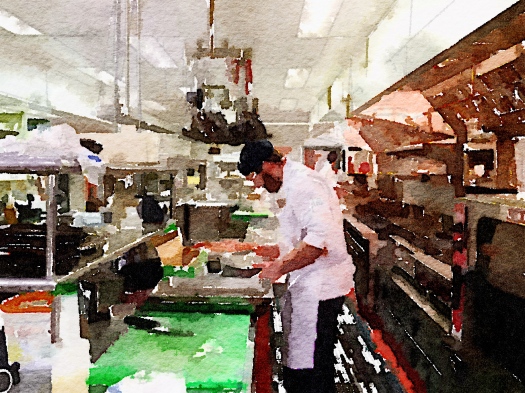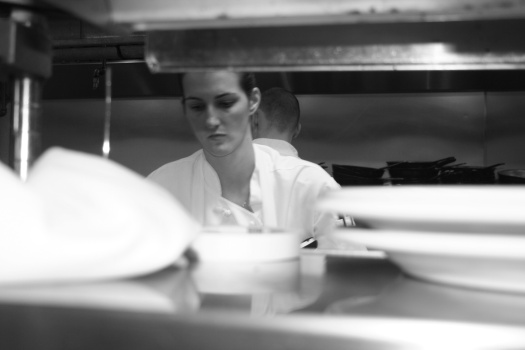
There are cooks and there are cooks – each has his or her list of responsibilities, required skills, and bag of tricks. Just because you are listed on a schedule as a cook does not necessarily mean that you are adept at filling every position under that designation. Grill cooks, sauté, prep, garde manger, bakers and pastry chefs are all very unique. Then there is the breakfast cook – although some cooks use this position as a stepping stone to the evening line – many are comfortable choosing this as their position of choice. If you fit the mold – then you possess a special value reserved for just a few, value that – to the chef goes way beyond the ability to prepare breakfast items.
Unlike other line positions where there is a time allowance for preparation, pacing of courses, and the detail work that equates to a meticulously aligned plate presentation – the breakfast cook must be efficient and fast. When the order is placed the cooking is almost instantaneous.
Finding that perfect person for the job is one of the more important tasks of the chef in a property. Comparable to finding a solid sous chef – this position must, at some point, almost become invisible. The chef wants to know that the cook will be there, will be ready, will be consistent, and will represent the quality that is expected of the operation – without much supervision. When this person is identified then the chef can rest easy.
There can occasionally be room for a creative dish or two, but when it comes to breakfast – most restaurant guests are looking for well-executed familiarity. At the same time, the guest is quite specific about how they like their breakfast items prepared – their expectations are clear. “I want my eggs over-easy but yolks that are not too runny”. “I want my waffles crunchy”. “Make sure that the scrambled eggs are dry”. “I like my bacon well done”. “A five minute egg (not shorter and not longer)”. The list goes on and on. Add this to an onslaught of orders coming in a breakfast crunch time and you can see how easy it would be for a cook to get frazzled.
So what are the unique attributes of this individual?
[] DEPENDABILITY:
The last thing in the world that the chef needs is that 5 a.m. call from the restaurant stating that the breakfast cook called out or didn’t show. The thought of jumping out of bed and rushing to the restaurant, setting up an unfamiliar station and trying to function while behind the eight ball is un-nerving. This is not the best moment in a chef’s day. He or she must be able to depend on the breakfast cook to be there or provide ample warning so that the chef can find a replacement.
[] INDEPENDENCE:
Oftentimes the breakfast cook is an island. It is very common to find, unlike the evening shift where there may be three or four line cooks for a meal period, the breakfast cook may be the one and only. Because of this, his or her planning, prep, organization, and attack are separated from the rest of the kitchen team. The right candidate must be able to function effectively in this manner.
[] EFFICIENCY:
Efficiency is the rule of law for all cooks, but even more so for the breakfast cook. When an order comes in it is immediately cooked, plated, and slid into the pass. This requires that the cook’s system is tight and foolproof. Mise en place has never been more important! The breakfast cook must be able to anticipate business volume, reflect on his or her past experience to assess what items will move, how many eggs to crack, how much batter to make, bacon to cook ahead, and plate garnishes to prepare. Considering the limited time available between orders placed and orders filled – there is no time to return to prep during service.
[] ORGANIZATION:
Pan placement, folded side towels, clarified butter placement, temperature of griddle, poaching water, and plate organization are all crucial, especially during crunch time. All cooks must be organized, but a breakfast cooks station will resemble the cockpit of an airplane – he or she will be able to point to the placement of each ingredient or tool without even thinking. If you want to see impeccable organization turn to chaos in a few seconds – let the chef jump behind the range to “help” a breakfast cook through the rush. Most cooks would rather not have the help. As a chef, whenever I helped I made sure that I stuck to garnishing plates and wiping the edges of china before a plate went into the pass.

Pans lined up waiting for the command.
[] MULTI-TASKER:
Eight pans of eggs cooking simultaneously (some sunny side, others varying degrees of over-easy), four orders of pancakes on the griddle, eggs benedict poaching, waffles in the iron, and a refresh on the oatmeal. This is constant, unrelenting as the dining room moves from a few guests at 6:30 a.m. to a full house by 7:15. Flip the cakes, slide the over easy eggs in a pan, respond to the buzzer on the waffle iron, plate up orders, transfer that rasher of bacon or triple sausage alignment, bark out: “pick up!”, and start all over again. Multi-tasking must be second nature.
[] SPEED:
Guests and in turn – servers have little patience during breakfast. The average dining room guest for breakfast is likely to spend no more than 30 minutes from the time they are seated. They have things to do, places to be, and breakfast is simply a means to an end. A five-minute wait seems like an eternity to a breakfast guest. The pressure is thus on the cook to be fast – lightning fast. To watch an efficient breakfast cook is mesmerizing. This modern version of the short order cook still amazes me.
I remember my first introduction to the cooking profession was watching a short-order cook through a restaurant window. At the age of 9 or 10, it was amazing to watch the efficiency and speed, the focus and the calmness of a person who was able to handle so many orders with grace. It is this experience that years later helped me to decide to become a cook and eventually a chef.
[] DETAIL ORIENTED:
As traditional and seemingly simple as breakfast may be, there is a detail that is expected, a focus on doing the little things right that makes all the difference in the world. If that bacon isn’t exactly how the guest likes it – the meal is substandard. If the oatmeal is not the perfect consistency, then it is pushed aside by a disappointed guest. If those eggs are too runny or not runny at all, then the expectation of a good start to the day is shattered. The details are small, but nevertheless important.
The breakfast cook cannot sacrifice the details for speed, nor speed for the details. It is a delicate balance.
[] ECONOMY OF MOTION:
The best cooks work from the standpoint of the pivot step. Everything must be within that pivot step if the system is to work. One step to the left or right, forward or back – any more and the game plan is in jeopardy. The more steps that a cook takes the greater the opportunity for mistakes. This is why organization and efficiency are so closely tied to how this station is set-up.

Focus, organization, efficiency.
[] FOCUS:
Watch this cook from the moment he or she arrives until everything is packed away for tomorrow. There is a focus that tells a story of oneness with the job. Walking through that back door at 4:30 a.m. – the cook clicks on that focus switch in his or her head and then it takes over. Flip on the lights and the hood fans, fire up the ovens for bacon and sausage, turn on the griddle to warm up, and the flat top that will accommodate those egg pans in a short period of time. Fill the steam table and grab a cup of coffee.
Roll out the cart with mise en place that was prepped at the close of yesterdays business, slide those first pans of bacon and sausage in the oven, set the timer, put on butter to clarify, and oil the flat top to welcome pre-cooked, diced potatoes for home fries. Crack a half case of eggs for scrambled, and finish the pancake and waffle batters that were measured out yesterday. Check plates for chips and cleanliness and restack in their assigned location. Pre-assemble garnishes, transfer eggs to cooler pans for easy access, keep those potatoes moving so that they are crisp on the outside and soft and warm inside, transfer cooked bacon and sausage to the steam table, fold side towels, and align spatulas, tongs, and slotted spoons for service. Pre-heat pans in that lowboy oven, and double-check all of your mise. Set up that pinch pot of salt and pepper, wash and dry berries of pancakes, remove the solids from that clarified butter, and grab another cup of coffee.
Only a few minutes till the dining room opens – time to check in with the dining room manager and walk through your checklist one more time. There will be no rest for the next three hours. Soon the action begins and if all is organized properly it will run like a well-rehearsed orchestra. At the end you will prep for tomorrow, clean your station, and pass on the spatula to the next shift.
PLAN BETTER – TRAIN HARDER
All respect for the breakfast cook
Restaurant Consulting
www.harvestamericacues.com BLOG
CAFÉ Talks Podcast

Leave a comment